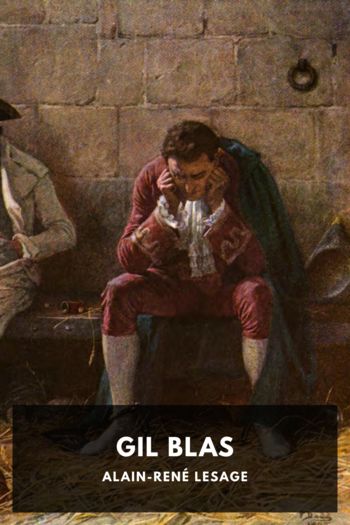This Land is no Stranger by Sarah Hollister (books to read for 13 year olds .TXT) 📗

- Author: Sarah Hollister
Book online «This Land is no Stranger by Sarah Hollister (books to read for 13 year olds .TXT) 📗». Author Sarah Hollister
“Nej!” Dollar Boy managed to shout. He staggered backward. He was offended more than injured.
“You took the truck out while I was gone.” Baron Kron made the fact sound like an accusation.
“Yes, yes! To the vet in Uppsala! I’m sorry!”
“All the way to Uppsala, boy? And without consulting Hugo?” Baron Kron again raised the crop. Dollar Boy rushed to answer before the whip fell once more.
“The specialist! Dr. Ek!”
When Baron Kron held his hand, Dollar Boy went on, a little more calmly. “Fenrir needed the specialist. And Hugo was gone, to Västvall, I think, to the neighbors, the Vosses, maybe.”
As sometimes happened with the baron, the storm blew over quickly. The labor situation at the lodge struck some outsiders as odd. Members of the Kron family had always been vocal defenders of what they thought of as national purity. The current baron remembered the days in the 1940s. His father had followed right-wing firebrand Per Engdahl and Nysvenska rörelsen, the New Swedish Movement.
The names of the rightist groups might have changed over the intervening years, but the slant of the rhetoric remained pretty much the same. Of late a ferocious anti-immigrant feeling had reinvigorated the right, making the WWII-era fury of Per Engdahl appear remote and quaint. But anyone paying attention recognized the connection.
So a visit to the Härjedalen lodge sometimes upset the political allies of Baron Kron. For a supposed supporter of radical xenophobia, the baron seemed to employ an awful lot of foreign faces around the farm, even a few Africans.
Dollar Boy’s real name was Lash Mirga. He was pure Romani, chache Roma, as they said. He looked outlandish, his pink hair shaved into an American-style mohawk. He was a mild and tender soul, but the mohawk gave him an intimidating look. Such was Dollar Boy’s wish, to frighten away anyone who sought to hurt him or anyone close to him. He loved to witness the reaction of the baron’s stiff-necked acquaintances when they beheld him in all his glory.
The estate employed several Romani “travelers.” Their presence had more than once bothered the political extremists who visited. The contradiction seemed to bother the baron not at all. In fact, he appeared to enjoy the discomfort of his purist friends. He possessed an absolute faith that anything he did was correct. If he wanted to bring in Martians, robots or gangs of pink-haired warlocks to do his work for him, by his lights that would be just fine, too.
Meanwhile Dollar Boy was playing a very dangerous game right under the baron’s nose. He had gained his nickname from a Yankee dollar bill he used to carry around when he was a kid, telling everyone that he would spend it in New York City one day. But Dollar Boy’s present scheme involved not money but love, real English romantic love, the type featured in plays and movies. And Dollar Boy’s was the most powerful kind of all, lost love.
Lel was his betrothed. The two of them were from the same village in Romania. They had come to Sweden together under the guidance of Moro Part. Dollar Boy went to work for the baron. Lel began her life as a mendicant, occupying different street corners in Stockholm. At times she worked the commuter trains, shaking paper cups at seated passengers who more often than not turned away from her.
At the end of each day Lel, Varzha Luna, and the rest of the rag-tag crew of beggars returned to Moro Part’s apartment, where a half dozen of them stayed. Dollar Boy sometimes visited them. The atmosphere at the apartment was warm and communal, part schoolyard, part sweatshop, part family. They created a simulacrum of Romania as best they could. They were Moro’s kids. He treated them with kindness. Mostly.
Lel was not the first to disappear. That was a girl named Ariadne. Moro usually stationed her in front of one of the large grocery store near Medborgarplatsen, the Citizen’s Square. The area was known for social justice demonstrations. Dollar Boy and Lel had wandered among the demonstrators on the big day last May. Large groups of people marched through the city shouting and singing. He liked these new compatriots of his, so earnest and courageous, standing up for the rights of others, generous with their donations.
Then, later in the summer, Lel was taken. Everything changed for Dollar Boy. He put away childish things. The peaceful ways of the Swedes no longer struck him so forcefully. He perceived dark undercurrents and secret dangers lurking beneath the surface of his adopted country. His old byword, “opportunity,” fell by the wayside. His new byword was also an old one, ancient as the mountains of Romania.
Revenge.
Leaving the barn with the red welt of the baron’s knout across the back of his neck, Dollar Boy crossed the yard to what workers called “the barracks.” The quarters for the help shared a building with a granary and thus with the granary’s rats. Some of the laborers kept slingshots around for entertainment.
Dollar Boy went to his closet-sized room, closing and latching the flimsy plywood door. Reaching into a locker beneath his cot, he retrieved his treasured iPhone. He worked in secret, checking in with the location tracker app he had installed. Consulting a worn paper map of Sweden, he found the place where the phone displayed a pulsing icon of a pinging cell tower. Somehow





Comments (0)